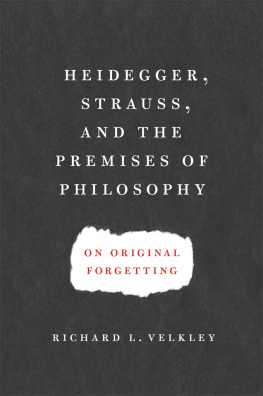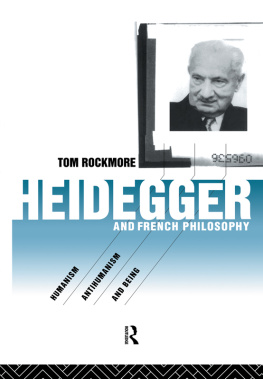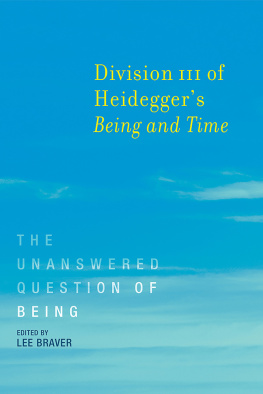REPHRASING HEIDEGGER
REPHRASING HEIDEGGER
A Companion to Being and Time
RICHARD SEMBERA

University of Ottawa Press 2007
All rights reserved. No parts of this publication may be reproduced, stored in a retrieval system or transmitted in any form or by any means, electronic or mechanical, including photocopy, recording, or otherwise, without permission in writing from the publisher.
LIBRARY AND ARCHIVES CANADA CATALOGUING IN PUBLICATION
Sembera, Richard, 1972
Rephrasing Heidegger : a companion to Being and time / Richard Sembera.
(Collection Philosophica, ISSN 14804670)
Includes bibliographical references and index.
ISBN 9780-776606637
1. Heidegger, Martin, 18891976. Sein und Zeit. 2. Ontology.
3. Space and time. 4. Phenomenology. I. Title. II. Series.
B3279.H48S445 2007 111 C20079062083
Published by the University of Ottawa Press, 2007
542 King Edward Avenue
Ottawa, Ontario K1N 6N5
www.uopress.uottawa.ca
The University of Ottawa Press acknowledges with gratitude the support extended to its publishing list by Heritage Canada through its Book Publishing Industry Development Program, by the Canada Council for the Arts, by the Canadian Federation for the Humanities and Social Sciences through its Aid to Scholarly Publications Program, by the Social Sciences and Humanities Research Council, and by the University of Ottawa.
We also gratefully acknowledge the Dominican University College whose financial support has contributed to the publication of this book.
ACKNOWLEDGEMENTS
This book has helped me more than any other project I have undertaken to appreciate how little academic work is really a solitary undertaking. When a book carries the name of a sole author, we tend to view that one person as the origin of the book, as its single and unique efficient cause. In fact, writing a book is really a common project to which many people contribute. It is rather like a movie or a play: we tend to remember the most visible figures, the so-called stars, and to forget the many others without whom the work could not have been accomplished. It is, in a way, a Heideggerian point: the full drift of the work prefers to conceal itself in the background for the sake of the clear display of the foreground.
Here at least I would like to invite some of the many who have helped me finish this project a moment to share the opening credits with me. I would first like to thank the Dominican University College as a whole for its financial support of the publication of this book. I would also like to thank my colleagues in the Department of Philosophy, particularly Gabor Csepregi, Maxime Allard, Jean-Franois Mthot, and Francis Peddle, for their friendship and assistance. I am also indebted to my doctoral thesis supervisor, Prof. Dr. Friedrich-Wilhelm von Herrmann, for his formative influence upon my academic style. I have learned much from my students, especially the ones who took the seminar in which I developed the basic ideas for this book, but in particular I feel that I have learned from working with Alan Gschwind, Christopher Kelly, Joseph Lo Mascolo, and Christian Wjcikiewicz. I am very grateful to Mr. ric Nelson of the University of Ottawa Press for his unfailing support of my book. Most of all, however, I am indebted to my wife, Bharathi Sriraman, who believed in and offered encouragement for this project in its incipient stages, long before anyone else did.
INTRODUCTION
[] Heideggers philosophical significance will have to rest on his publications. There is no way of getting around these. Few, if any, second-hand accounts can pave the way to them. Almost all of those now available in English are marred by the mere fact that they are found in the misleading context of accounts of existentialism, which Heidegger repudiates. Most of them fail to realize the development in Heideggers thinking. And they are even less adequate as introductions to the phenomenological aspects of Heideggers work. Thus the challenging problem of providing a real introduction to Heideggers thinking remains unsolved to this hour. In stating this I do not mean to imply that it can be solved, especially at this stage when important evidence is still missing. Yet the attempt ought to be made, if only for the sake of better relations between the main philosophical currents of our time. (Herbert Spiegelberg, The Phenomenological Movement. A Historical Introduction. Second edition. Martinus Nijhoff: The Hague/Boston/London, 1978; p. 274.)
The aim of this book is to present the main ideas of Being and Time, Heideggers most important philosophical work, in a clear and accessible manner. In so doing, the book also strives to correct certain fundamental misconceptions of Heideggers thought, including the mischaracterization of Heidegger as an existentialist.
No one could plausibly deny that Being and Time is a dense and difficult philosophical treatise. Its stylistic flaws, even in the original German, are too obvious to excuse. Nevertheless it is equally undeniable that Being and Time is an original, systematic, and epoch-making philosophical work. Without a doubt it was one of the most influential books of the 20th century, and its influence on contemporary thought is continuing and pervasive. I think it is fair to say that on the whole Heideggers own stylistic excesses, as well as those of his imitators and, I fear, his detractors, have tended to produce a nimbus of unintelligibility surrounding what Heidegger actually believed and thought.
The present exposition is devoted to making the conceptual underpinnings of Being and Time transparent in order that its philosophical significance may be better understood. The title of this book, Rephrasing Heidegger, was chosen in order to emphasize this point. While a certain amount of technical terminology is indispensable to any intellectual work, there are ways of minimizing the burden placed upon the readers goodwill. For the sake of intellectual honesty, I have made concessions that Heidegger himself it must be emphasized was not prepared to make. An author, like an educator, has an ethical obligation to the audience to be clear and comprehensible. Whether Heideggers rejection of this obligation can be philosophically justified is a question that I myself have answered in the negative.
Often it seems as though biography and exposition are confused in outlines of Heideggers thought. The impression is sometimes produced that political criticism of Heidegger, as justified as it may be, ebbs over into ad hominem arguments against his philosophy. For this reason, there will be a firm emphasis throughout the whole of the present book on Being and Time as a work of philosophy. Other writers have addressed the question of Heideggers rather less than laudable political activities at length, and I see no reason to belabour the point here. The present book concentrates on Heideggers philosophy as it is expressed in Being and Time, and it is left to the reader to form an opinion concerning the connection, if any, between Heideggers philosophical beliefs and his political beliefs.
Rephrasing Heidegger is addressed primarily to students, both graduate and undergraduate, encountering Heidegger for the first time, as well as to anyone who is in need of a solid acquaintance with Heideggers philosophical thought. It is also hoped that the book will be useful as a textbook or companion to seminars on Heidegger, since it was written to fulfill that function for my own seminars.
Next page








